The image of the Virgin Mary is one of the symbols most loved by all Christians. The figure of the Virgin Mary as the mother of Jesus and mother of all of us serves as comfort and protection at all times.
Our Lady the Virgin Mary has a very important presence throughout the Christian liturgical calendar. There have been many apparitions and miracles with which the Virgin has shown her love for humanity. That is why there are an innumerable number of Marian dedications, Marian festivals and celebrations: the day of the Virgen del Carmen, the day of the Virgen de Fátima, the day of the Virgen del Rosario, ...
A series of Marian religious articles is collected in this section. Products decorated with Marian symbols, with images of the Virgin Mary,...
Holy Mary pray for us.
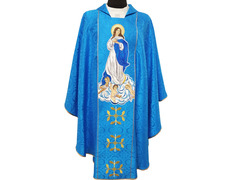
Ref: 4B20167

Ref: 84R019
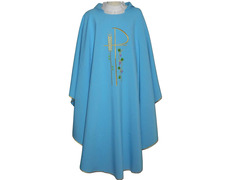
Ref: 52B506A

Ref: 84B006

Ref: 52F572

Ref: 56B029

Ref: 52F60520

Ref: 84B018
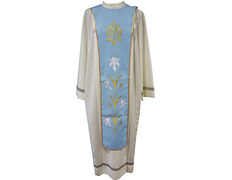
Ref: 84R015
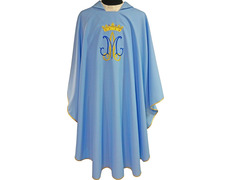
Ref: 84T019
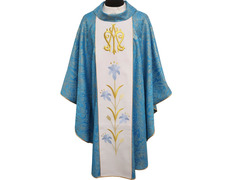
Ref: 84R019

Ref: 84B018
The liturgical chasubles as a fundamental garment within the clothing of the priests have a very important role in Marian celebrations and festivals . The liturgical colors that are usually used during the celebrations of the Marian feasts are light blue and white.

Ref: 84B802

Ref: 56B282

Ref: 56B283

Ref: 84F012MA
Marian stoles and stolons are liturgical vestments used by priests to officiate celebrations during festivals linked to the Virgin Mary, such as the feast of the Immaculate Conception of Mary.

Ref: 84FK02

Ref: 56B004

Ref: 84F0W5

Ref: 84F13A

Ref: 84F004
In addition to the Marian stoles and chasubles , in our online store we have for sale other Marian ornaments for parish use. Liturgical ornaments such as shoulder cloths, altar cloths, altar sets, etc...

Ref: 11B504

Ref: 11B603

Ref: 11B502

Ref: 11B501
Images of the Virgin Mary occupy a central place on altars and processions. Marian figures can be made of different materials. One of the most popular figures are the images of Santa Maria to wear. Marian images which are dressed to enhance their beauty.
The dresses are used to dress the images of the Virgin Mary. When buying a dress for a dress figure we have to take into account a series of variables that conditions the price of the garment.

Ref: 11B551

Ref: 11B550

Ref: 11B554

Ref: 11B553
The cloaks are other of the most used garments when it comes to dressing the images of the Virgin Mary . The cloaks are garments made of different materials that are placed on top of the dresses. Normally the Marian figures to wear are usually wood carvings .
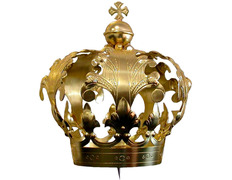
Ref: 33FA100

Ref: 33FA104

Ref: 33FA124

Ref: 33FA105

Ref: 33FA102
Crowns are one of the symbols that have been used since time immemorial to identify kings and queens. The Virgin Mary is the Queen of Heaven and Earth . The Holy Mary is the Queen of the Universe because, in addition to her great virtues, she is the mother of Jesus, the King of Kings.

Ref: 33FB16

Ref: 33FB21

Ref: 33FB30

Ref: 33FB20

Ref: 33F0B1
The halos for images of the Virgin Mary are another of the goldsmith elements with which the Marian figures are decorated. The halos, rings and diadems are pieces of goldsmithing that are used to highlight the divinity of Our Lady the Virgin Mary.

Ref: 0F12110

Ref: 0F12110

Ref: 0F12101

Ref: 0F12101

Ref: 0B019
Numerous pieces of gold work are used to decorate the images of the Virgin Mary . In many cases, some of the religious goldsmith articles are used in an image corresponding to a Marian dedication.

Ref: 56B010

Ref: 56B023

Ref: 56B018

Ref: 56B012

Ref: 56B058
Marian tapestries have historically only been purchased by kings, lords and very important people. The reason is that the manual weaving process was very expensive and the population could not afford to buy Marian tapestries.
With the arrival of the machines and the production in each allowed the price of Marian tapestries to drop drastically. Nowadays tapestries with images of the Virgin Mary decorate houses and churches of all kinds.

Ref: 2FA29N1
The Virgin of Lourdes, also known as Notre Dame de Lourdes, is one of the images of the Virgin Mary that arouses the greatest devotion in Europe.

Ref: 2FA452

Ref: 2FR4780

Ref: 2FR478
The veneration of Our Lady of Fátima has its origin in the apparitions of the image of the Virgin Mary in Fátima (Portugal).

Ref: 2FR164

Ref: 2FA11
Already from the Gospels the faithful are invited to follow with devotion the figure of the Immaculate Heart of Mary. Fundamentally, it is the Gospel of Saint Luke that speaks of the benefits of devotion to the Sacred Heart of Mary.

Ref: 2FR401

Ref: 2FD135

Ref: 2FR501

Ref: 2FA473

Ref: 2FA216
The religious images of the Virgen del Carmen have faithful followers in all corners of the world. On July 16, the day of the Virgen del Carmen, patron saint of sailors, is celebrated. The celebrations of this day are of great importance in all those cities and towns linked to the sea.

Ref: 2FA278
The feast of the Assumption of the Virgin Mary, on August 15, is the celebration of Our Lady's ascent to heaven to become Queen and Lady of all Creation.

Ref: 2FR11
On September 15 we celebrate the feast of the Virgen de los Dolores, also known as Virgen de la Amargura, Virgen de la Piedad, Virgen de las Angustias, Nuestra Señora de los Dolores, or simply La Dolorosa.

Ref: 2FA526
In the year 1218 the Blessed Virgin appeared to San Pedro Nolasco. In this apparition, the Virgin Mary asks the saint to found a religious community to help Christians who are helpless in distant places. This is the origin of the Order of Santa María de la Merced, a religious order that has done important work during its many centuries of history. The devotion to the Virgen de las Mercedes expands together with the growth of the Order of Mercy.

Ref: 2FA459

Ref: 2FR200

Ref: 2FA221

Ref: 2FR172
The Holy Rosary is a tool that Holy Mary gave to all Christians to lead a life according to the teachings of Jesus. The rosary is a key that opens the doors of the Kingdom of Heaven for us.

Ref: 2FR184A12

Ref: 2FR60N3
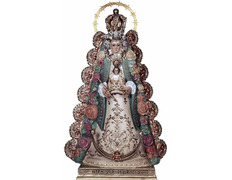
Ref: 2FM174N1

Ref: 2FR497

Ref: 2FM150

Ref: 2FA222

Ref: 2FR473

Ref: 2FR574

Ref: 3F7122

Ref: 92B1124FA

Ref: 92B1124ME

Ref: 92B1168PS
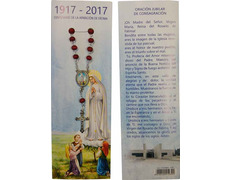
Ref: 92B1710FA
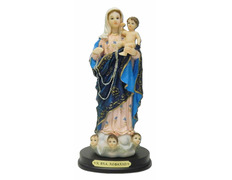
Ref: 59B3926
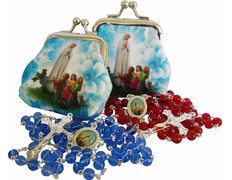
Ref: 92B1071FA
The liturgical chasubles as a fundamental garment within the clothing of the priests have a very important role in Marian celebrations and festivals . The liturgical colors that are usually used during the celebrations of the Marian feasts are light blue and white.
In general, Marian chasubles are embroidered with elements related to the Virgin Mary, such as: the Marian anagram or symbol, lilies, images and figures of the different Marian dedications (Virgen del Perpetuo Socorro, Virgen del Carmen, Virgen de Fátima, etc), …
In our online store you will find a wide catalog of Marian chasubles made of different fabrics.
Marian stoles | Priest stoles for Marian feasts
Marian stoles and stolons are liturgical vestments used by priests to officiate celebrations during festivals linked to the Virgin Mary, such as the feast of the Immaculate Conception of Mary.
Like chasubles, Marian stoles and stolons are usually white or light blue. They are normally embroidered with Marian elements that are related to the Virgin Mary (lilies, symbol of the Virgin Mary, etc…) and/or Marian elements that are associated with a certain dedication (Virgin of Fátima, Virgin of Lourdes, etc…).
In addition to the Marian stoles and chasubles , in our online store we have for sale other Marian ornaments for parish use.
On the one hand, you can buy priestly garments such as the Marian shoulder cloth. On the other hand, textile elements can be purchased to decorate the altar during the festivities of the Virgin Mary. Elements such as the tablecloth for the altar table, the altar set for the Eucharist, the Marian lectern cloth, etc…
All these Marian ornaments , made of different fabrics, are usually decorated with embroidery linked to Saint Mary: the Marian symbol or monogram (formed by an A, for Ave, an M, for Mary, and a crown), lilies, figures and images of the Virgin, etc...
Images of the Virgin Mary occupy a central place on altars and processions. Marian figures can be made of different materials. One of the most popular figures are the images of Santa Maria to wear. Marian images, often wooden carvings, which are dressed to enhance their beauty.
The dresses are used to dress the images of the Virgin Mary. When buying a dress for a dress figure, we must take into account a series of variables that conditions the price of the garment:
Dresses for images can be made of different fabrics: brocade dresses, velvet dresses, satin dresses, etc…
Most Marian devotions are related to a specific type of color. Thus, for example, black dresses are usually used for images of the Virgen de los Dolores, brown dresses for images of the Virgen del Carmen , white dresses for images of the Miraculous Virgin, pink dresses for figures of Our Lady of the Rosary, etc…
Each dress is tailored to the image that will dress it. It is very important to take the correct measurements so that the dress fits the image.
Dresses for images of the Virgin Mary can be decorated with different types of elements: embroidery, appliqués, braids, lace, etc…
The cloaks are other of the most used garments when it comes to dressing the images of the Virgin Mary . The cloaks are garments made of different materials that are placed on top of the dresses. Normally the Marian figures to wear are usually wood carvings .
To select one mantle or another, depending on the budget, we must take into account a series of factors that determine the purchase price.
To select the fabric of a mantle for a Marian image, the fabric of the dress must be valued. It is important that the fabrics of both garments are complementary in terms of fabric. There are brocade mantles, velvet mantles, satin mantles, etc…
As is the case with the color of the dresses for Marian images, many of the invocations of the Virgin Mary are associated with a color of the mantle. Thus, for example, the cloaks for images of the Virgen de los Dolores are usually black, the cloaks for images of the Virgen del Carmen are usually brown, the cloaks for images of the Miraculous Virgin are usually light blue, etc…
Each cloak, like the dresses, is made to measure. In other words, the mantle used in an image of the Virgin is not usually suitable for another Marian figure. For this reason it is very important to carefully measure each image to make the mantle appropriate to the proportions of the size.
Dresses can also be ornate to a greater or lesser extent. The buyer can choose to make a more sober mantle or a more ornate mantle. Preferences in this regard depend on the taste of the buyer.
On some occasions it may be appropriate to accompany a highly embroidered dress with a sober mantle looking for an aesthetic balance.
Crowns are one of the symbols that have been used since time immemorial to identify kings and queens. The Virgin Mary is the Queen of Heaven and Earth . The Holy Mary is the Queen of the Universe because, in addition to her great virtues, she is the mother of Jesus, the King of Kings.
The crowns transform the images of the Virgin, providing greater beauty and royalty. In our online store you can buy a wide variety of crowns.
Crowns for images of Santa Maria made of silver, crowns of gold or silver metal, crowns made of bronze, metal crowns with gold or silver baths, etc... You can also find a wide variety of shapes and styles. Count crowns, imperial crowns, crowns with halos, royal crowns, etc…
Crowns for the Virgin Mary can vary in degree of ornamentation. Being able to go from county crowns decorated with simple fleurs-de-lys to imperial crowns decorated with halos, an orb, crosses, etc…
If you want to buy a crown for an image of the Virgin Mary, you must take into account the diameter of the figure's head. This measurement determines the diameter of the base of the crown.
The halos for images of the Virgin Mary are another of the goldsmith elements with which the Marian figures are decorated. The halos, rings and diadems are pieces of goldsmithing that are used to highlight the divinity of Our Lady the Virgin Mary.
Halos are usually placed on the back of marine images, especially in festivals related to the Virgin Mary. The terms of halo, ring and diadem are often used interchangeably, but there are small differences between the three concepts.
The Marian halos
The halos are a circular piece of religious jewelry. It is usually decorated with Marian symbols such as stars, fleurs-de-lis and sparkles. They are normally fastened to the back of the Marian figure's head with a spike or spike.
Diadems are normally used only to decorate religious images of the Virgin Mary. They can have decorations very similar to halos (sparkles, stars, etc…) but they have a semicircular shape.
Numerous pieces of gold work are used to decorate the images of the Virgin Mary . In many cases, some of the religious goldsmith articles are used in an image corresponding to a Marian dedication.
This is the case, for example, of the heart of the Virgin Mary pierced by seven daggers. The heart is linked to the seven great pains that the Holy Mary suffered throughout her life. The heart pierced with seven daggers is usually placed in the images of the Virgen de los Dolores.
The same thing happens with the crescent . This Marian complement is usually linked to certain apparitions and representations of Our Lady. For example, the figure of the Virgin of Gaudalupe of Mexico is usually represented on a crescent. This representation is based on the testimony of the seers.
Marian tapestries have historically only been purchased by kings, lords and very important people. The reason is that the manual weaving process was very expensive and the population could not afford to buy Marian tapestries.
With the arrival of the machines and the production in each allowed the price of Marian tapestries to drop drastically. Nowadays tapestries with images of the Virgin Mary decorate houses and churches of all kinds.
Marian tapestries are made by weaving high-quality threads that allow images to be faithfully reproduced. Famous paintings of the Virgin Mary are often used as models for most Marian-themed tapestries. Religious paintings that, for certain reasons, have achieved great recognition among the general public.
For example, the Marian tapestry that recreates the painting of the Annunciation by Blessed Angelico, or the Marian tapestry that reproduces the Byzantine Icon of Our Lady of Perpetual Help, or the tapestry of the Virgin of Guadalupe in which the figure that remained engraved on Juan Diego's Indian cloak, or the reproduction of the painting Virgin with Child (Madonnina) by Ferruzi.
Other Marian tapestries for sale in our online store simply reflect images of important situations linked to the Virgin Mary. This is the case of the appearance of the Virgin of Fatima to the three little shepherds in the cave of Iria, or the Sacred Heart of the Virgin Mary, or the image of the Miraculous Virgin over the world with two rays coming out of her hands.
The Virgin of Lourdes, also known as Notre Dame de Lourdes, is one of the images of the Virgin Mary that arouses the greatest devotion in Europe. Every year thousands of people travel to the town of Lourdes to admire the Virgin Mary and drink the miraculous water that flows from nearby sources.
The Virgin Mary appeared in the apparition in the Massabielle grotto, on the banks of the Gave river, on the outskirts of the town of Lourdes, on February 11, 1858, the 14-year-old girl Bernadette Soubirous.
In 1862, Pope Pius IX authorized the local bishop to allow the veneration of the Virgin of Lourdes. As a result of this authorization, a basilica is built according to the importance of the place.
The veneration of Our Lady of Fátima has its origin in the apparitions of the image of the Virgin Mary in Fátima (Portugal).
The Virgin Mary chose three little shepherds to make her secrets known to the world: Lucía dos Santos and her two cousins, Francisco and Jacinta Marto. The three children are known as the three seers of Fatimas or, simply, as the three little shepherds of Fatima.
The Virgin Mary appeared in Fatima seven times, six of them during the year 1917 and the last one in the year 1920.
We celebrate the day of Our Lady of Fatima on May 13, the day on which the Virgin of Fatima appeared for the first time in 1917.
Already from the Gospels the faithful are invited to follow with devotion the figure of the Immaculate Heart of Mary. Fundamentally, it is the Gospel of Saint Luke that speaks of the benefits of devotion to the Sacred Heart of Mary.
The Virgin Mary, during her apparitions at Fatima, reminds all the faithful that the salvation of the world passes through love for the Sacred Heart of Mary.
We celebrate the day of the Sacred Heart of Mary on the Saturday of the week following Corpus Christi Sunday. The Sacred Heart of Mary is intimately linked with the Sacred Heart of Jesus, for this reason they are celebrated on consecutive days, Sacred Heart of Jesus on Friday and the Sacred Heart of Mary on Saturday.
The religious images of the Virgen del Carmen have faithful followers in all corners of the world. On July 16, the day of the Virgen del Carmen, patron saint of sailors, is celebrated. The celebrations of this day are of great importance in all those cities and towns linked to the sea.
The origin of the devotion to the Virgen del Carmen is very old, in the years after the Second Crusade. It was born in the lands of Israel, in a place known as Mount Carmel (origin of the name of Our Lady of Mount Carmel and the Carmelites, their followers). The year 1155 was established as the beginning date of the devotion to the Virgen del Carmen, at which time the French crusader Bartolomé Avogadro, known as Blessed Bertoldo del Monte Carmelo, decided to follow in the footsteps of the prophet Elijah and traveled to Mount Carmel to lead a hermit life. In this way a small community was born that did not stop growing.
The feast of the Assumption of the Virgin Mary, on August 15, is the celebration of Our Lady's ascent to heaven to become Queen and Lady of all Creation.
The Assumption of Our Lady of one of the oldest Marian Advocations. There is evidence of Marian celebrations linked to the Assumption of the Virgin Mary since the 5th century.
In the images of the Assumption of the Virgin Mary is usually represented standing on a cloud. Next to the cloud, the Angels raise the body and soul of the Virgin Mary to heaven.
On September 15 we celebrate the feast of the Virgen de los Dolores, also known as Virgen de la Amargura, Virgen de la Piedad, Virgen de las Angustias, Nuestra Señora de los Dolores, or simply La Dolorosa.
During the celebration of the day of Our Lady of Sorrows we remember the seven sorrows of the Virgin Mary:
In the year 1218 the Blessed Virgin appeared to San Pedro Nolasco. In this apparition, the Virgin Mary asks the saint to found a religious community to help Christians who are helpless in distant places.
This is the origin of the Order of Santa María de la Merced, a religious order that has done important work during its many centuries of history. The devotion to the Virgen de las Mercedes expands together with the growth of the Order of Mercy.
On September 24 we celebrate the day of the Virgen de las Mercedes, also known as the day of the Virgen de la Merced, the day of Our Lady of Mercy or the day of Our Lady of Mercy. Marian feast that was initially instituted in the Mercedarian Order and that was later extended to the Universal Church.
The Holy Rosary is a tool that Holy Mary gave to all Christians to lead a life according to the teachings of Jesus. The rosary is a key that opens the doors of the Kingdom of Heaven for us.
At the beginning of the 13th century, the Virgin Mary appeared to Santo Domingo. The saint was able to see that Saint Mary was carrying a rosary in her hand. The Virgin taught Santo Domingo to pray the rosary. Holy Mary asked him to make the prayer of the Holy Rosary known to the world. The Virgin promised him that if he recited the prayers as She had taught him, he would be able to save many souls.
The Blessed Virgin Mary made fifteen promises to Santo Domingo. The Virgin said:
- Whoever serves me, praying my Rosary daily, will receive whatever grace he asks of me.
- I promise my protection and great benefits to those who devoutly pray my Rosary.
- The Rosary will be a defense shield against hell, it will destroy vices, free sins and exterminate heresies.
- The Holy Rosary will make the virtues germinate and will also make its devotees obtain divine mercy. It will substitute in the hearts of men the love of the world for the love of God and will raise them to desire heavenly and eternal things. How many souls will be sanctified by this means!
- The soul that commends itself for the Rosary will not perish.
- He who devoutly prays the Holy Rosary, considering mysteries, will not be oppressed by misfortune, nor will he die an unhappy death. He will convert, if he is a sinner. He will persevere in grace, if he is just. In any case, he will be admitted to eternal life.
- The true devotees of the Rosary will not die without the help of the Church.
- I want all devotees of the Holy Rosary to have the light and fullness of grace in life and death, and to be participants in the merits of the blessed.
- Soon I will free from purgatory the devout souls of the Rosary.
- The true children of the Rosary will enjoy a unique glory in heaven.
- Everything that is asked of me, through the Rosary, will be achieved quickly.
- I will help those who spread my Rosary in all their needs.
- All those who pray the Rosary will have as brothers in life and in death the blessed in heaven.
- Those who pray my Rosary are all my very beloved children and brothers of my son Jesus.
- Devotion to the Holy Rosary is a manifest sign of predestination to glory.
We celebrate the Marian feast of the Virgen del Rosario on October 7 in memory of the Battle of Lepanto. Battle in which the Christian troops, after praying the Holy Rosary, were victorious.